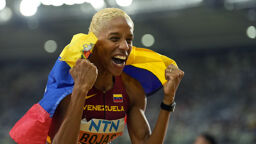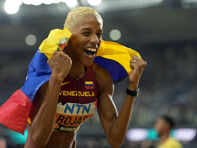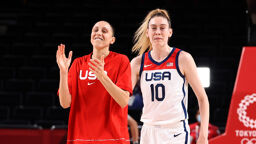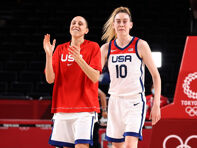Nothing prepared me for their reaction, and I knew nothing could prepare me. It was the beginning of the season, but we were starting to bond more as a team, and inevitably, starting to get to know each other, which was my worst fear. The jump from high school cross country to collegiate was formidable in a lot more respects than just mileage. In high school, the races are 5K’s while in college they’re usually 8K’s, but the increase in distance was not the cause of my anxiety for the first month or so of the season. I was terrified of my teammates finding out that I’m gay. It wasn’t really a matter of if, but a matter of when.
I’ve been living openly since my freshman year in high school in Pennsylvania. Initially coming out of the closet proved to be by far the most challenging stage of the coming out process, mostly due to the fact that prior to my freshman year I’d been through nine straight years of Catholic education at Our Lady of Mount Carmel elementary school. Growing up from kindergarten to 8th grade in an extremely small (graduating class of 31), extremely parochial atmosphere impacted my life to an unfortunate extent. The earliest I can remember experiencing attraction to other guys was back in 6th grade, and yet I remember how much I denied the occurrence. It simply couldn’t be true. God wouldn’t do this to me.
I totally suppressed any thoughts, attractions, or tendencies geared towards the same sex, because I knew that they just couldn’t be real, that they would just go away. I struggled with this internal demon for a few years, taking a long time to even acknowledge the possibility of my own sexuality, let alone accept it. I hated myself, and more than anything I was genuinely petrified of actually being gay. Eventually towards the end of 8th grade, the graduating year for my Catholic elementary school, I told a select few of my best friends that I was gay. They were fine with it, and I was utterly flabbergasted.
The later transition to public school in 9th grade gradually instilled in me both self awareness and self confidence. I came to accept myself, and also realize that I was fortunate enough to live in a comparatively progressive, open minded and accepting school community and township alike. In the spring of freshman year, I started to answer honestly to the typical middle school "new kid" interrogations, e.g. "Do you have a girlfriend?" "So what chicks do you think are hot?" "Do you wanna get with her?"
"No, I’m actually into dudes," I started to respond, with years’ worth of denial, self hatred, and internalized homophobia being lifted off my freshman shoulders.
I continued on through high school living openly, not having to hide or constantly cover myself up. The remaining years of high school proved to be spectacular, and I was beyond fortunate enough to have never had to deal with any major bullying or harassment issues. I ran four years of cross country earning my varsity letter each year and ran outdoor and indoor track. My team was inclusive and accepting, and I never had any notable problems with them. We worked together and we worked hard. Everyone knew and nobody cared. The act was over, and I was finally living freely.

Ian and Drew: Davies was nervous about his social media photos but his college teammates were cool with them.
During the fall of my senior year of high school, I met a guy online. It turned out he lived only 20 minutes away from Doylestown, Pennsylvania, in Hatboro, and went to a school in my area. We chatted, and both became skeptical of each other’s authenticity; we shared the same interests, both of us ran cross country and track and both of us had similar tastes. It seemed too promising to be believable. ‘Guys like him don’t actually exist, and the ones that do are all straight,’ I distinctly remember thinking. After a while of messaging and later texting, we decided to meet face to face at a cross country invitational at which both of our teams were competing.
I was nervous beyond belief, and we only spoke briefly and awkwardly. Some months of on-and-off texting passed after that. Eventually we decided to hang out one-on-one, after coincidentally seeing each other again at a winter track meet. We spent more time together, went on dates, and fell for each other. I gathered the courage to ask him out in early February, and to my utter delight, he said yes. Drew and I have been together since then, a little over nine months. He’s my rock, and I love him more than anything.
Fast-forward to mid-August, 2015, my Bucks County hometown is almost three hours away, and I don’t have any clue as to how my new college team is going to react. I knew a few of the guys on the team before I arrived on the Shippensburg campus for preseason, and I knew they knew, since we followed each other on social media and I had posted pictures of me and my Drew at prom and such.
While I knew these guys had no problem at all with my sexuality, I still had no idea how the rest of my team was going to take it. I constantly replayed scenarios in my head, imagining the very guys I run so many miles with ostracizing me, ridiculing me or berating me with insensitive questions. With only 14 roster spots for the team this past season, the most haunting possibility was their rejection. On such a small team and with such extensive amounts of time spent training together, it would be impossible to ignore the negativity. Thankfully, none of my nightmares ever became reality. My team’s "reaction" was more of a non-reaction.
Everything kind of fell into place during a workout one night. I was running with my pace group and we were all talking about a recent race we had, trading stories. Then one of my teammates whom I’m closer with said, "Oh yeah, I saw your boyfriend taking pictures during the race!" My heart dropped straight into my trainers. I knew he knew, but I still didn’t know who else on the team knew. "Oh, you’re right! I think I saw him too, was he the blonde one?" inquired another teammate. My heart slowly crept back up from the depths of my running-mutilated feet. ‘So they know I’m gay, and they don’t actually care? They’re actually cool with that? What is this sorcery?’ I thought earnestly.

I acknowledged that yes, he's my boyfriend Drew, and then they joked a bit about trying to pose for pictures when they saw him during the race. The conversation moved on, but that’s just it: the conversation didn’t dwell on that fact that I’m gay. My sexuality wasn’t the punchline of a joke, nor has it ever been with my team. To them, it was just an aspect of me, like my hair color or shin splints. It simply didn’t matter. Since then, my team has been more embracing than I could’ve ever asked for. My sexuality is a non-issue for my team, exactly how it should be. We joke, laugh, train, sweat, and bond together, with no regard given to who I am inherently, only to who I am as a person and fellow athlete. I feel immensely blessed to be training and working alongside such an inter-dependable and inclusive group of guys, and I am proud to run with teammates who take pride in me as well.
Unfortunately, I know my experience is the not the norm for all gay collegiate athletes. Not all teams are or are going to be as progressive as the team I am lucky enough to be running for. My main message by sharing my story as an out college distance runner is simple and twofold: It gets better, but my experience within college athletics should be the rule, not the exception. While I cannot emphasize enough my gratitude and appreciation for my cross country teammates, I know that countless other LGBT+ collegiate athletes don’t find such an atmosphere awaiting them.
Progress is necessary, and issues within the LGBT+ athletic community must be addressed. Representation matters, especially for LGBT+ people. If you can, I encourage the use of coming out as a tool for representation and inclusion, and as a non confrontational way of asserting both identity and validity. No teammate should have to live in fear of coming out, nor should any teammate suffer ridicule for their sexual orientation or gender identity/expression. Taking action and addressing any problematic or hateful behaviors within a team is vital in making a difference for LGBT+ athletes.
Our voices need to be heard, and our voices need to be respected. Equality and social justice have always been passions of mine, and I hope that one day, through actively striving for representation and fair treatment for LGBT+ athletes, an inclusive and supportive team such as mine becomes an expectation, not a privilege.
Ian Davies, 18, is a freshman at Shippensburg University in Pennsylvania, majoring in English and Secondary Education. He is a member of the cross country, indoor track and field, and outdoor track and field teams. He is also an activist for LGBT issues and a member of the school's Students Advocating for Equality (SAFE). He can be reached via email ([email protected]); Facebook; Twitter (@ianthedavies); and Instagram (@ianthedavies).







































